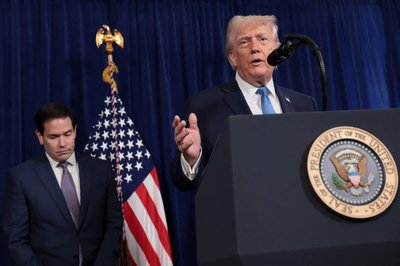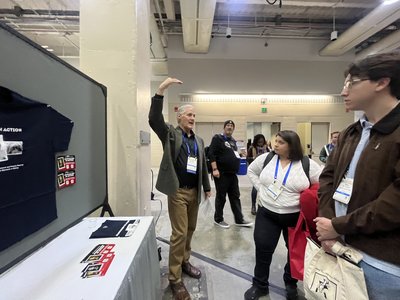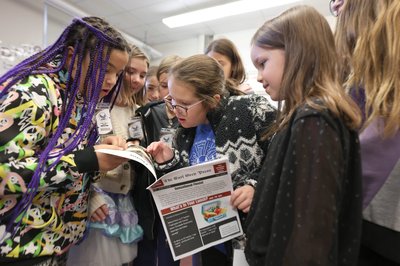
Flowers and American flags are seen at the reflecting pool of the 9/11 Memorial before memorial observances held at the site of the World Trade Center in New York City, New York, U.S., September 9, 2021. REUTERS/Jeenah Moon
Originally published 2021
by Sari Beth Rosenberg, New York City high school teacher
The 20th anniversary of 9-11 will also mark my 20th year of teaching history in New York City public schools.
That September day 20 years ago was to have been my first day of student teaching at LaGuardia High School. I lived in Hell's Kitchen at the time. I always set my alarm clock to Z-100 because "The Z Morning Zoo" show was enough annoying madness to get me out of bed to start my day.
In my morning grogginess, I thought the Z Morning Zoo crew was engaging in a dark joke: something about the World Trade Center getting hit by a plane? I rushed to the living room to turn on the Today Show. It was real. I started making phone calls to friends already at work downtown. A friend called me from the roof of her office building on Canal Street and that's when I saw that the first tower was about to collapse. I screamed at her: "RUN!" and didn't hear from her until 8 hours later when she made her way to my apartment. My brother who normally took the PATH train to the World Trade Center had fortunately taken a different route that morning. He also made his way to my apartment along with a whole group of friends. My apartment became a refuge. We sat in stunned silence watching the news.
It was impossible to wrap my head around the deep tragedy happening in real time. In a state of shock, I obsessively worried out loud that I was going to be in trouble for not reporting to my first day at school.
I ended up student teaching at Stuyvesant High School for the next semester. Each day I had to pass by the gaping hole that was once the World Trade Center. It never got easier. I always lowered my head in reverence to the lives lost, trying hard not to stare too long at the site that was once my city’s beloved Twin Towers.
While I mourned, I was surprised that my students—kids who had to run for their lives that day—seemed disaffected by the event. Were they still in shock?
From personal history to just plain history
19 years ago, when I first started teaching at the school where I still teach now, the High School for Environmental Studies, there was a one-year 9-11 memorial. Students performed spoken word poems, shared their memories from that day, and the dance team performed to Cam'ron's "Welcome to New York City".
It's the home of 9-11, the place of the lost towers, We still banging, we never lost power, tell 'em.
Welcome to New York City, welcome to New York City.
For the next few years, we held moments of silence at the precise times when each of the two towers fell. I would begin the school year by asking students to share their memories of 9-11 as a device to get them to start thinking about the work of historians.
As time passed, new crops of students were too young to remember 9-11. So, I told them my story and shared other primary and secondary sources when the anniversary came around each year.
Over the course of two decades, I watched 9-11 evolve from a personal moment in my students’ lives to just another page in the textbook.
9-11 became personal again
I began to emphasize the civil rights abuses and Islamophobia that occurred in response to 9-11, and my own memory and retelling of 9-11 changed, especially in the context of Trump's America.
In 2018, I made sure to remind my students that ICE was created in response to 9-11. They learned that the U.S. Immigration and Customs Enforcement was a federal law enforcement agency under the Department of Homeland Security (DHS), a cabinet agency created in 2002 to secure America from terrorist threats and attacks.
Many of my students are undocumented. In 2017, teachers distributed letters to remind students and parents of their rights: they were safe from ICE agents once they entered the school. "New York City is a sanctuary city, that means the federal government cannot access your records in the school building," I informed my students. When I first started teaching, I could never fathom having to address this topic with my students.
By the year 2000, four years into the Trump presidency, most of my students felt even less safe. After the 9-11 attacks, most of them feared another Al Qaeda or ISIS terrorist attack. After Trump’s election, most of my students were more afraid of their own government and how the agencies originally designed to protect them from an external threat were now being weaponized against Americans who posed no threats whatsoever.
A new brand of terror
January 6, 2021, I found myself watching my TV in a terrified trance, just as I had done on September 11th. Instead of fighting for Al Qaeda, these domestic terrorists were fighting for Trumpism and “The Big Lie” about election fraud. As much as we’ve become well-accustomed to watching history unfold in real time, it almost felt like I was watching a documentary with my students. I was waiting for the Ken Burns effect to kick in as Morgan Freeman narrated the scene.
After seven hours, I shifted my focus from my TV screen to my laptop: How was I going to teach about this moment to my students? The events were still unfolding as I went to bed., I would have figure it out in the morning
These days I wake up to MSNBC instead of the Z Morning Zoo, perhaps a sign of the times or an indication of my maturity, or a combination of the two. As I opened my laptop to teach my virtual classes on January 7th, I decided to simply share my screen, clicking through images from the Capitol Insurrection. I told my students to write down their questions, reactions, and thoughts about what had unfolded.
They wrote:
White Supremacy
Not surprised
My mom said it felt like 9-11
We are really living through history
I’m so scared
Disappointed
Disappointed
Disappointed
As I watched their words populate the Google Meet chat on screen, I was not surprised. None of what happened in Washington, D.C. was shocking to most of my Gen Z students. Born in the shadow of 9-11, they spent their elementary years amidst the backdrop of the War on Terror, lived through the Great Recession, endured the Trump years, are trying to survive a global pandemic and watching their grandparents and others died from it, while coping with remote learning, and now, processing a chilling domestic terror attack.
When I teach about 9-11 this 20th anniversary year, I have the added layer of the U.S. Capitol attack to include in the narrative. As we learn more about the 1-6 Insurrection, it is a reminder that terror, in different forms and iterations, is sadly endemic to the American story.
20 years later
As the United States departs Afghanistan, I anticipate that my incoming U.S. History and AP U.S. History students will have a renewed interest in 9-11 and the corresponding War in Afghanistan. 9-11 frames my teaching career, however for my recent students it is yet just another page in the story of America. From what I know about my Gen Z students, they will be concerned about the Afghan citizens, including the women, under Taliban 2.0 rule. They will also already be making connections between global conflict and climate change, I work at an environmentally-themed high school after all. Also, since I teach New York City kids, they have stories from their parents who still remember 9-11. For all of us who lived here then, it is forever seared into our memories.
It is my job as an educator to arm my students with facts, critical thinking skills, and an empathetic understanding of the past. If we’ve learned anything over the past twenty years, education is crucial if we have any hopes of creating a world that is one day free of violence, fear, and terror.

Sari Beth Rosenberg has been teaching U.S. History and AP U.S. History at a New York City public high school, the High School for Environmental Studies, for the past 20 years, and she currently hosts the PBS NewsHour Classroom Educator Zoom Series. Rosenberg has been featured in various publications and multimedia platforms, including USA Today, NBC News, CNN, The TODAY Show, Washington Post, Reuters, Parents Magazine and many more. Rosenberg is a co-founder of Teachers Unify To End Gun Violence and serves as a senior advisor for Voters of Tomorrow. Find her on Twitter & Instagram @saribethrose.





